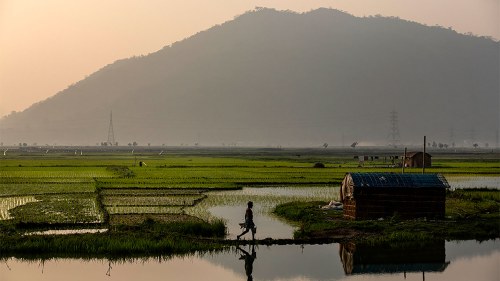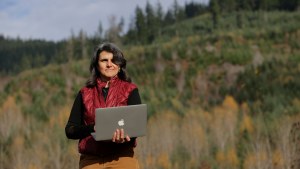Moonshot, Bug Benefits, and Imperfect Food
Check out our roundup of the week's top news and research in food, agriculture, and global development.

Top Story
Another Rice Crisis?
Volatile grain prices ahead of India’s general election next year have spooked the government, leading to bans or export taxes on most kinds of rice and wheat. Representing about 40 percent of the global rice trade, India has significant control over the rice market, causing prices to spike 28 percent in September, with higher prices on the horizon.
Council Insights
Gender and AI
“Regardless of where you may fall in the AI debate—it is here to stay,” writes Molly Shields in a GFFT blog. “It is naïve to believe agricultural AI will fade, and for that reason alone, the agricultural industry must commit to gender mainstreaming.” Read the full blog.
 Food and Agriculture
Food and Agriculture
Food and Agriculture
Insect Issues
A new study estimates that two million insects are at risk due to climate change, doubling previous approximations. Insects are key to agricultural production, with 75 percent of food crops relying on pollinators to some degree. Three to five percent of global produce production is already lost due to inadequate pollination, and this number is expected to increase.
Salmonella Outbreak
Sweden’s largest egg producer will euthanize all its chickens after a salmonella outbreak. It has a stock of 1.2 million chickens, making up 20 percent of all laying hens in the country. The company’s recurring outbreaks in recent years led the Swedish Board of Agriculture to order the culling of the entire flock.
Trading Partners
Changing climate conditions, high-value crops, sustainable farming practices, and geopolitical tensions with China have made Vietnam a growing source of premium agricultural products like coffee, watermelons, and coconuts for the United States. The United States recently became Vietnam’s biggest agricultural trading partner, with the southeast Asian country exporting $10.8 billion in agriculture products to the United States last year.
Deeper Dive
Bug Benefits
Now that key pollinators are at risk due to climate change, the race is on to build the world’s biggest bug farm to produce a more sustainable animal feed. Insect farms feed bugs with food waste before turning their feces into fertilizer and their bodies into protein and nutrient-rich feed for fish and livestock. Insect startups have raised over $1 billion in the last three years.
Resilience
Moonshot
Scientists in China have found a way to make lunar soil fertile by introducing bacteria and enhancing phosphorus availability for plant growth. Experiments with simulated lunar soil showed that treated soil produced healthier plants with longer stems and roots. This breakthrough holds promise for sustainable food production in future lunar bases.
DC Report
Meat Monopoly No More
The Biden administration introduced a federal rule mandating that major meatpackers inform chicken growers about contract risks to enhance transparency and competition. This move is part of broader reforms to address concerns about deceptive practices and market manipulation in the meat industry. While farmers' groups support the measure, critics, including the National Chicken Council, argue it may lead to litigation and disrupt the industry.
Big Actors
Reducing Emissions
New Zealand's Fonterra aims to achieve a 30 percent reduction in on-farm emissions by 2030 across its nearly 8,500 farms. Fonterra plans to do this through improved farm practices, novel technologies, and offsetting emissions through planting. Agriculture, particularly methane emissions from livestock, constitutes almost half of New Zealand's total greenhouse gas emissions.
Big Ideas
Imperfect Food
Commercial buyers' insistence on visually perfect produce is causing significant food waste, with nearly 14 million kilograms of edible fruits and vegetables rejected annually in Australia based on aesthetics alone. The imperfect food movement is gaining momentum globally as merchants seek to change perceptions of what constitutes edible produce, urging consumers to reconsider traditional standards of beauty in fruits and vegetables.
Ask an Expert
What should be done to improve water security for the poor in Sub-Saharan low- and middle-income countries?
“Investments in water security for Sub-Saharan low- and middle-income countries are among the best ways to reduce poverty and improve climate resilience for the poor. The African Development Bank estimates that every $1 invested in water and sanitation there results in at least a $7 economic return for the population. Failure to make this investment is costly -- the UN's Continental Water Investment Programme notes that poor access to safe water and sanitation costs Sub-Saharan Africa five percent of its annual GDP. Drinking water and sanitation improvements are relatively simple to provide, and they go a long way toward climate resilience for the poor and for women in particular. Placing more wells within 30-minute roundtrips from people's homes drastically reduces the amount of time that water collection takes and reduces disease burdens associated with poor sanitation. Because smallholder farmers continue to be among the world's poorest people, investments in small-scale irrigation make them more productive and resilient to climate change, as do efforts to retain soil moisture through changes to cropping practices. More productive farms, more efficient drinking water access, and a lower disease burden are all necessary for economic growth in Sub-Saharan Africa and are essential for climate resilience.”
—Nonresident Fellow Michael Tiboris


Have a question about food and agriculture? Ask one of our experts at the Center on Global Food and Agriculture to get an answer in next week's Global Food for Thought!
Council Events
Did you miss one of our previous livestreams? Don't worry! They are all available on our website to watch at any time.
Other Upcoming Events
The Diverse Leaders in Climate and Agriculture Summit
Date: November 17 – 18
Tackling Obesity and Noncommunicable Diseases in Mexico: A Policy Approach
Date: November 21
Time: 9:00 – 10:30 a.m. ET
Securing Women’s Resource Rights through Gender Transformative Approaches: Perspectives from The Gambia
Date: November 24
Time: 8:00 – 9:30 a.m. CT
Food Security and Agrifood Trade in Latin America and the Caribbean
Date: November 28
Time: 10:00 – 11:00 a.m. ET
The Eighth Global Meeting of the Farmers’ Forum
Date: February 12 – 13
Land Acknowledgement Statement
The Center on Global Food and Agriculture recognizes it occupies the ancestral land of the Kiikaapoi, Peoria, Kaskaskia, Bodwéwadmi, and Myaamia people. Indigenous communities around the world disproportionately experience the pressures of climate change, global conflicts, and the COVID-19 pandemic, while simultaneously stewarding 80 percent of the world’s biodiversity. These Indigenous tribes and nations are the original owners of this land and continue to be systemically erased by policies and practices that ignore their histories. To learn more about Indigenous foodways and practices, check out our 2022 blog series "Stewardship, Sovereignty, and Solutions."






